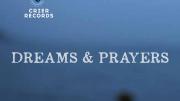The debut album from Crier Records, the record label of the chamber orchestra A Far Cry (profiled in our January/February issue), has been nominated for a Grammy Award. Dreams and Prayers is the only member of its category, Best Chamber Music/Small Ensemble Performance, to have been crowd-funded on Kickstarter; a sampling of the music may be heard on the album’s website. Winners will be announced on February 8.
Miki-Sophia Cloud ’04 first proposed the program for the group’s sixth season, as a concert exploring music and spirituality; she traces the central themes of Dreams and Prayers back to her undergraduate studies. “I'd grown up in the Protestant tradition, where when you go into a sanctuary, everything is pretty spare,” she says. “There isn't a lot of emphasis on the sensual, physical side of human experience and how it ties to spirituality.” A course with Richard Wolf introduced her to Sufism; other classes steeped her in Christian literature. “We read all of these mystical saints’ writings, and I found them absolutely fascinating because there was something really earthy about them,” Cloud recalls. Among these figures was Hildegard von Bingen, the Benedictine abbess who composed O ignis spiritus paracliti (“The Origin of Fire”), the chant that the group transcribed into violin monody as the album’s opening track.
Cloud’s approach to this music was further shaped by having studied with Robert Levin ’68, particularly in his chamber music course, Music 180: “He spent three hours with us every Monday night talking about how to really interpret music, how to build interpretation with integrity, how to approach music as a human being—with integrity and an earnest quality, and with a scholarly mind.”
Dreams and Prayers ends with Beethoven’s String Quartet No. 15, “Heiliger Dankgesang,” which she describes as “a really direct, sort of spiritual communion between a composer and God—but maybe outside of a direct faith tradition.” Beethoven wrote this “song of thanksgiving” when he’d healed from a difficult sickness, explains Cloud: the music serves as an expression of faith. “That’s something that I remember being instilled in me, during all of Professor Levin’s lectures—that music can be earthshakingly powerful for people.” (Levin, who retired from Harvard last year, will perform with A Far Cry at the New England Conservatory in January.)
Meanwhile, Crier Records has kept the group busy: no sooner had they celebrated the release of Dreams and Prayers than they followed it with The Law of Mosaics in November. The album, pairing works by contemporary composers Andrew Norman and Ted Hearne, attracted the notice of The New Yorker’s classical music critic, Alex Ross ’90, who named it among the “Notable Performances and Recordings of 2014.” A third album, compiling recordings from live concerts at Jordan Hall, will follow early next year.









